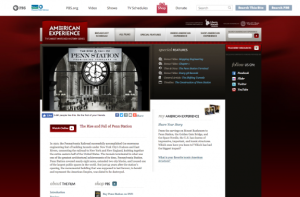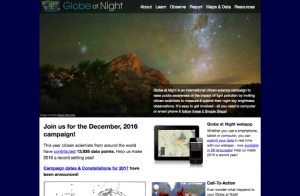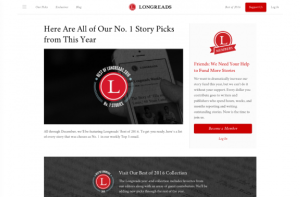General Interest
Back to Top
|
 |
|
Origins of Skiing in Canada's National Capital Region
|
Social studies |
|
As winter revs into gear, skiing enthusiasts will want to check out the Origins of Skiing in Canada's National Capital Region, an online exhibit from the Virtual Museum of Canada and the Canadian Ski Museum. With more than 100 artifacts on display (including photographs, articles, and memorabilia), the exhibit charts the history of skiing in Ottawa from the late nineteenth century through the 1960s. As the Canadian Ski Museum notes, "Historically, the origin of skiing activity in the National Capital Region is inseparable from the founding and evolution of the Ottawa Ski Club." Accordingly, many items also highlight the Ski Club and its influence on the sport. Visitors can browse items individually or explore four curated exhibits in the Stories section of the website. For instance, in George's Trail, visitors can read a 1924 article that claims to explain how the trail got its moniker. [MMB] |
|





|
|
 |
|
 |
|
American Experience: The Rise and Fall of Penn Station
|
Social studies |
|
At the turn of the twentieth century, the Pennsylvania Railroad (PRR) was the largest corporation in the world, and president Alexander Cassatt (brother of artist Mary), was determined to build a tunnel through the Hudson River to connect Philadelphia and Manhattan. In this episode of PBS's American Experience, viewers can learn more about PRR, Cassatt, and the design and construction of both the Hudson River tunnels and the magnificent Pennsylvania Station. As this documentary points out, Penn Station was constructed at the same time as other pioneering construction projects, including the Brooklyn Bridge and the Panama Canal. However, the $59 million project was unique in that it was entirely the initiative of PRR, with no government funding. This documentary explores the project from a variety of perspectives, including workers (over a dozen lost their lives constructing the tunnel) and PRR's decision to demolish the Penn Station building in 1963, which sparked movements to preserve historic buildings. On this website, visitors can watch this documentary in full and check out a number of accompanying resources, including bonus videos, articles, and a timeline. [MMB] |
|





|
|
 |
|
The History of Emotions Blog
|
Social studies |
|
Queen Mary University of London is Home to the History of Emotion Centre, a center dedicated to a growing subfield of history that explores the intersections of social and cultural history and the history of science and medicine. Historians of emotions explore a number of questions, such as: What social and linguistic forces have shaped how people categorize their emotions throughout history? And, how have the physical expressions of emotions, such as yawns, screams, and smiles, changed over time? On the History of Emotion Centre's interdisciplinary blog, visitors can learn more about the history of emotions via scholarly and popular articles, podcasts, and more. For example, in one recent post about the history of anger, Kirk Essary explores the different words used to describe anger-like feelings in early languages, and how many of these words describe emotions that differ from our contemporary understandings of anger. Meanwhile, in a series titled Normativity November, Sarah Chaney, David Saunders, and Stacy Hacker each explore normality throughout history from different perspectives. [MMB] |
|





|
|
 |
|
Globe at Night
|
Science |
|
Light pollution has greatly diminished how well individuals around the world can view the night sky. For the past decade, the National Optical Astronomy Observatory has hosted Globe at Night, a citizen science project that collects global data about light pollution. The project invites participants to fill out a form that details their location, the sky conditions, and what constellations they observe. On this website, visitors can explore collected data in a variety of ways, including an Interactive Data Map, a Regional Map Generator, and an Interactive Data Map. In 2015, Globe at Night collected data from 105 countries. Thanks to widespread citizen participation in this project, Globe at Night provides useful information for stargazers around the world. Those interested in participating can find more information here. [MMB] |
|





|
|
 |
|
American Vernacular Music Manuscripts: ca. 1730-1910
|
Arts |
|
Throughout American history, music has been a central part of daily life, religious practices, and social events. From the Center for Popular Music at Middle Tennessee State University (MTSU) and the American Antiquarian Society, comes this extensive database of music manuscripts from the eighteenth, nineteenth, and early twentieth centuries. On this website, visitors with a specific research question can conduct a detailed search for a particular song, songwriter, or subject in order to find digitized copies of music manuscripts. Alternatively, those interested in casually browsing the collection may want to start with the site's Gallery of Images, which highlights a variety of collection materials. These include two hymns published in Providence, Rhode Island in 1802 and intended to be sung on the anniversary of American Independence, and a handwritten songbook featuring a number of songs about the U.S. Civil War. This collection will be of interest to fans of music and American history alike. [MMB] |
|





|
|
 |
|
Longreads
|
Language Arts |
|
If you love longform writing across a variety of genres and subjects, then Longreads is for you. Founded by Mark Armstrong in 2009, Longreads publishes original investigative journalism, essays, and fiction pieces. In addition, Longform also curates works of 1,500 words or more that have been previously published in other magazines. Visitors can check out original pieces in the Exclusives section or curated pieces in Our Picks. Recently published Exclusives include a retrospective appreciation by musician Tom Maxwell of "Ella and Louis," a 1956 collaboration between Louis Armstrong and Ella Fitzgerald; an excerpt from novelist Marcy Dermansky's recently published, The Red Car; and an essay by Stanford University professor Adrian Daub about the origins and ubiquity of the "BRAAAM" sound in movie soundtracks (you'll recognize it thanks to included embedded videos). In the Our Picks section, readers will not only find a diverse collection of essays, but also lists to aid in the discovery of new reading material. As of this write-up, readers can find a variety of "year end" lists, including the best Under-Recognized Books of 2016. [MMB] |
|





|
|
 |
|
Geek's Guide to the Galaxy
|
Arts |
|
This podcast is for fans of science fiction and fantasy in all of its forms - including "books, movies, games, and comics." Geek's Guide to the Galaxy is hosted by fantasy writer David Barr Kirtley and John Joseph Adams, editor of science fiction anthologies and Lightspeed Magazine. The show features interviews with a diverse group of authors and conversations about a wide variety of issues, from science to filmmaking to identifying as a "nerd" or a "geek." Recent guests include novelists Karen Russell, Hyperbole and a Half comic artist Allie Brosh, author Malcolm Gladwell, and actor John Cleese. As one can gather from this list, Geek's Guide to the Galaxy is eclectic enough to appeal to a wide variety of listeners in addition to sci-fi aficionados. Visitors to this website can follow links to listen to full episodes, which run approximately one hour in length, via Wired magazine. Visitors can also download episode transcripts and check out related reading from this website. [MMB] |
|





|
|
























